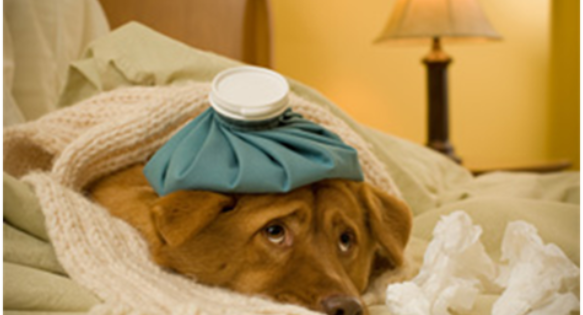




Holiday Articles
K9 Kampus sanitizes our equipment and play areas every evening to make every effort to decrease the possibility of our
clients getting sick. However, as with people colds, airborne germs can affect dogs too. Also keep in mind that there are so many different strains of the flu and Bordetella that even getting the vaccine doesn’t completely defend you from all strains.
We require all dogs that enter the facility to be vaccinated against Bordetella at least once a year but we recommend every 6 months
It’s Cold and Flu Season for your dog too!
Dog colds, also called upper respiratory infections are a common ailment that can affect any dog. Colds in dogs are very similar to the types of cold humans get, but are specific to dogs only. They are caused by viruses or bacteria spread from other animals. Just like you, a dog can become more susceptible to colds if they are exposed to stresses and their immune systems cannot ward off an attack from a virus or bacteria. Most dog colds will often clear up on their own once the dog’s immune system is back at full strength. However, untreated cold symptoms can lead to more serious health problems, and other serious dog health conditions can present in your dog as simple cold symptoms. Proper treatment of your dog’s upper respiratory infections is crucial to maintaining your dog’s overall health, and to keep him happy and comfortable as well.
Determining that your dog has a common cold is relatively simple, as the symptoms are often very similar to the signs you get when you have a cold. Dogs with colds may have sneezing, coughing, runny noses or eyes, congestion, and may also display a lack of energy or decreased appetite. These symptoms are caused by a variety of viruses and bacteria, such as the parainfluenza virus, Adenovirus type-
Because upper respiratory infections affect a dog’s bronchi, trachea and sinuses, he also may have difficulty breathing. Judging whether your dog’s cold symptoms warrant a trip to the vet’s office requires that you understand your dog’s medical condition and the dangers to his health from these conditions. Very young puppies, older dogs or dogs with compromised immune systems are more vulnerable to the problems presented by upper respiratory infections, so it is best to have a vet check up if your puppy or dog displays symptoms of a cold. Severe difficulties with breathing or long term lack of appetite are also signs that you should bring your dog in to the vet.
Sometimes dogs will develop a more serious condition from an upper respiratory infection that has not been treated properly, such as pneumonia, or an inflammation of the lungs. Pneumonia is very dangerous to dogs and should be treated immediately. Often common cold symptoms in dogs will begin to clear up or lessen in a few days, but there are also other conditions that may first present symptoms that resemble those of the common cold but last longer and may need more advanced treatment. A constant, raspy cough often accompanied by phlegm like discharge is usually referred to as canine kennel cough. Other symptoms related to this problem resemble those of the common cold. This condition is highly contagious and is caused by the bordetella bronchiseptic bacteria and the parainfluenza virus and possibly other agents as well. It can result in your dog feeling sick for up to 20 days in severe cases. Distemper is another serious illness that often shows up with cold like symptoms but progresses into a multisystem disease affecting the gastrointestinal tract and central nervous system. It is incurable and often fatal. The virus that causes distemper is known as canine distemper virus or CDV and is very contagious. Luckily there is a vaccine to prevent this disease.
Treatment for dog colds may be performed at home if the case is not too severe. No one likes to be sick, including your dog so help him out by making him as comfortable as possible. Make sure that he gets plenty of fluids and stays warm and dry. Cold weather can really affect dogs with colds. Many of the human treatments for colds work well for dogs too. Some warm chicken soup or brown rice can help if he doesn’t feel like eating and getting a lot of sleep will help boost his immune system. Never give your dog human cold medicines. Colds will often clear up after a few days rest, but keep a watchful eye to make sure that his conditions do not get worse.
In severe cases your vet may choose to treat your dog with antibiotics to remove the bacterial infection. Antibiotics do not work against viruses, but may help in preventing secondary bacterial infections that may slow down his healing process. There are also several homeopathic remedies that may help out your sickly dog. Ferrum phos, kali sulp and magnesium phosphate are all herbs known to aid in recovery as well as eastern purple coneflowers and ribwort plantains.
Preventing a common dog cold from becoming a more serious condition can be accomplished through a proper vaccination program outlined by your vet. Canine distemper, Kennel cough, Adenovirus type 2 and Parainfluenzia all have vaccines available. Getting your new puppy properly vaccinated and keeping up with the yearly vaccination schedule afterward will help prevent your dog from getting a potentially life threatening condition. Everybody gets the common cold from time to time. Learning to recognize the signs and symptoms will help you keep your dog comfortable and happy and back on track in no time.
For More information go to http://www.dogillness.org/dog_colds/dog_colds.html

We want the holidays to be a happy time for you and your pet, not a time for an emergency visit to your veterinarian. The food and decorations that make the holidays so much fun for us can be dangerous for your pet. We do not want this article to dampen your spirits but we do want you to be aware of the dangers and plan carefully to avoid these potential hazards.
Food Related Items
Holiday food we enjoy cooking and eating can be a problem for your pet. Here is a short list: Rich fatty foods like gravy or grease can cause problems ranging from stomach upsets to pancreatitis which is an inflammation of the pancreas. Alcohol, chocolate, coffee & tea, uncooked meat & fish, bones from fish meat or poultry. Tobacco products can be fatal if ingested and signs of poisoning develop within 15 to 455 minutes. Uncooked dough, grapes and raisins are also toxic, artificial sweeteners that are present in some gums, mints and candy, macadamia nuts, is also toxic
Poisonous Plants
Many holiday plants are poisonous: holly leaves and berries, mistletoe, poinsettias and Christmas trees. Please go to the link to get details on the symptoms caused by these plants. Top
For more information on Decorations & wrappings, gifts under the tree and other items to be concerned about during the holiday season go to: http://www.peteducation.com/article.cfm?c=2+2098&aid=932 or our website to connect to the entire article.
Ah, the sights, the sounds and the smells of the holidays! For some dogs, the holidays are a cornucopia of joy. A friendly dog loves the hustle and bustle; new people, new things and, best of all, good food stream into the house. For all he knows, the show is being put on for his benefit. It's like a never-
Dog Stresses
The holidays put a lot of stress on everyone involved, some of it good and some of it bad. Our pets have to withstand any number of unusual circumstances that are novel each year because they don't have the chance to get used to them. Do dogs experience stress? We believe they do.
These are just a few of the situations dogs have to deal with:
A constant stream of company.
Lousy eating habits.
Less exercise.
Foreign objects.
Frequent scolding.
Kenneling. The other side of traveling during the holidays is putting dogs into a kennel. For a dog, a good kennel should be like vacation, with a lot of activities to keep him occupied (although he's still going to miss you like mad).
Tips to Help Minimize Dog Holiday Stress
So what can you do to ease the burden? Three words: routine, routine, routine. Keeping as close as you can to your pet's normal schedule is the best antidote to holiday stress. Stay consistent with feeding times and amounts, and be on guard against illegal snacks.
Maintain his exercise, walking schedule and playtime. A tired pet is a happy pet. This advice, by the way, goes for people too. Exercise is a great stress reliever. If time is precious, combine your exercise with your pet's by setting aside a specific amount of time each day – 20 minutes for instance – for you both to play and work up a little healthy sweat. Staying in shape improves attitude and behavior in pets and people.
To view the complete article go to http://www.petplace.com/dogs/holiday-
Articles found on this page